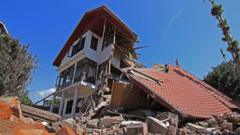In the wake of a tragic attack that claimed 26 lives, Indian authorities in Kashmir have demolished the homes of suspects and detained numerous individuals for questioning amid rising tensions with Pakistan.
India Intensifies Actions Following Kashmir Attack: Houses Demolished, Suspects Detained

India Intensifies Actions Following Kashmir Attack: Houses Demolished, Suspects Detained
Authorities in Kashmir are escalating their response to the recent attack, demolishing homes linked to alleged militants.
Authorities in Indian-administered Kashmir have intensified their response to a brutal attack that resulted in the deaths of 26 people last week. Following this devastating incident near the tourist town of Pahalgam, security forces have demolished the houses of at least 10 individuals alleged to be connected to militant activities. Explosives have been utilized to destroy these properties since last Tuesday, with at least one linked to a suspect implicated in the shootings.
India has accused Pakistan of harboring the militants responsible for the attack, though no specific group has been named. Pakistan has, in turn, denied these claims. The violence marks the deadliest civilian attack in the region in two decades, triggering a series of military responses from both countries.
In the aftermath, Indian security operations have led to more than 1,500 arrests as authorities conducted extensive searches throughout Kashmir. While the demolitions appear to target the families of suspected militants, officials have not publicly clarified the rationale behind these actions. The state’s Chief Minister, Omar Abdullah, voiced concerns about the need to ensure that innocent lives are not adversely impacted by the government’s crackdown. Former Chief Minister Mehbooba Mufti echoed these sentiments, calling for a clear distinction to be made between terrorists and civilians.
The unsettling atmosphere has also affected Kashmiri students enrolled in educational institutions outside their home region, with reports of harassment and threats against those perceived as belonging to the community.
Indian police have so far named three of the suspected attackers involved in the killings, revealing that two are believed to be Pakistani nationals, while one is from Kashmir itself. Speculation surrounding the motivations and background of the attack remains rife, with various militant groups claiming and subsequently denying involvement.
Prime Minister Narendra Modi has vowed to pursue justice for the victims, promising that those responsible will face severe consequences. Meanwhile, tensions between India and Pakistan have quickly escalated, with both nations engaging in retaliatory actions such as suspending diplomatic treaties and firing across the Line of Control.
In this volatile climate, international entities, including the United States, are encouraging both nations to seek peaceful resolutions to the ongoing hostilities, further complicating an already delicate situation. Efforts for de-escalation continue, amid calls for both sides to engage in dialogue to avoid further violence and ensure stability in the region.
India has accused Pakistan of harboring the militants responsible for the attack, though no specific group has been named. Pakistan has, in turn, denied these claims. The violence marks the deadliest civilian attack in the region in two decades, triggering a series of military responses from both countries.
In the aftermath, Indian security operations have led to more than 1,500 arrests as authorities conducted extensive searches throughout Kashmir. While the demolitions appear to target the families of suspected militants, officials have not publicly clarified the rationale behind these actions. The state’s Chief Minister, Omar Abdullah, voiced concerns about the need to ensure that innocent lives are not adversely impacted by the government’s crackdown. Former Chief Minister Mehbooba Mufti echoed these sentiments, calling for a clear distinction to be made between terrorists and civilians.
The unsettling atmosphere has also affected Kashmiri students enrolled in educational institutions outside their home region, with reports of harassment and threats against those perceived as belonging to the community.
Indian police have so far named three of the suspected attackers involved in the killings, revealing that two are believed to be Pakistani nationals, while one is from Kashmir itself. Speculation surrounding the motivations and background of the attack remains rife, with various militant groups claiming and subsequently denying involvement.
Prime Minister Narendra Modi has vowed to pursue justice for the victims, promising that those responsible will face severe consequences. Meanwhile, tensions between India and Pakistan have quickly escalated, with both nations engaging in retaliatory actions such as suspending diplomatic treaties and firing across the Line of Control.
In this volatile climate, international entities, including the United States, are encouraging both nations to seek peaceful resolutions to the ongoing hostilities, further complicating an already delicate situation. Efforts for de-escalation continue, amid calls for both sides to engage in dialogue to avoid further violence and ensure stability in the region.






















